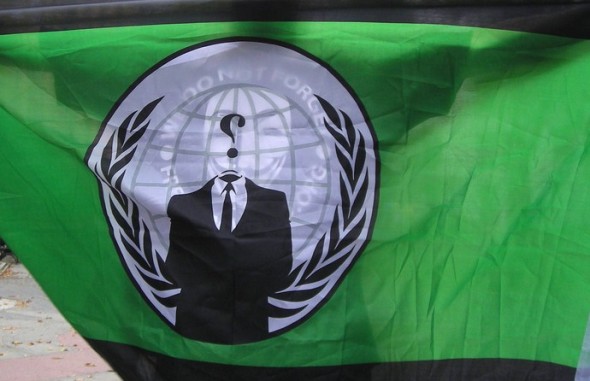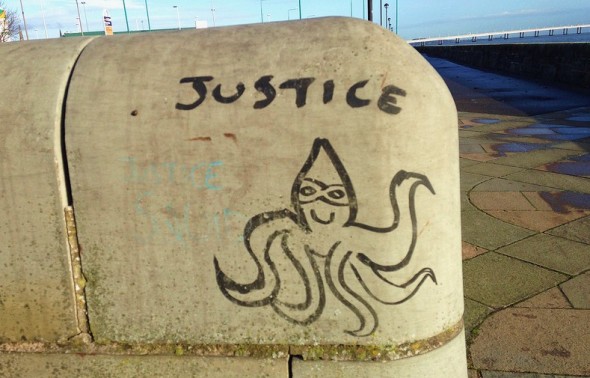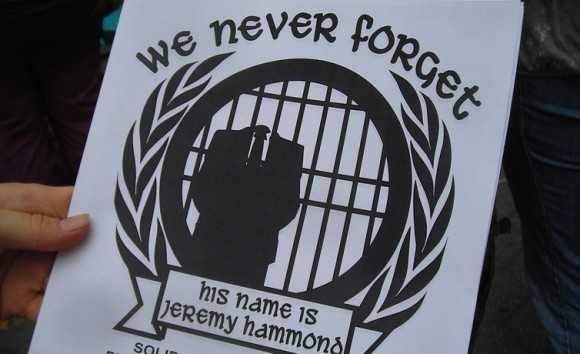Political Prisoner Hammond: When Entrapment and Abuse of Power Subvert Justice
“Those in power do not want the truth exposed.”
Jeremy Hammond, Nov 15, 2013
The hacktivist wars have taken another turn with the sentencing of Jeremy Hammond, an individual who became something of a guerrilla journalist when he attempted to cut the Gordian knot of secrecy. In donning such combat gear, he has paid a heavy price: a 10-year prison sentence, plus three years of supervised release for his actions against the private intelligence firm Strategic Forecasting (Stratfor). These involved hacking servers, wiping out files and databases, stealing some five million private email messages, relayed to WikiLeaks, and 60,000 customer credit-card numbers. The details, which revealed spying on activists, proved to be useful for Anonymous; they were also used to donate $700 thousand fraudulently to non-profit groups for Christmas 2011.
In Hammond’s statement, read to United States District Judge Loretta Preska, a range of motivations were cited. “I targeted law enforcement systems because of the racism and inequality with which the criminal law is enforced.” He also “targeted the manufacturers and distributors of military and police equipment who profit from weaponry used to advance US political and economic interests abroad and to repress people at home.”
For Hammond, the recipe of civil disobedience remains the only means of effective reform against the surveillance state, one indivisible with corporate and military interests. Security firms are the malicious sores of this arrangement, working “in secret to protect government and corporate interests at the expense of individual rights, undermining and discrediting activists, journalists and other truth seekers, and spreading disinformation.”
This sentence is not merely one on Hammond. The entire trial has done nothing in terms of demonstrating what “good” or altruistic hactivism might be, as opposed to what might be deemed detrimental, let alone malicious. It suggests that firms such as Stratfor, officially in the business of providing geopolitical intelligence to subscribers, can claim to be victims despite being responsible for monitoring activists.
Hammond always operated in a grey realm, with skirting shadows; but he was the aggravated symptom of the new security state. That he was allegedly prompted to hack the details of foreign governments under the direction of Federal Bureau of Investigation (FBI) informant Hector Xavier Monsegur (Sabu) further indicates the nature of that foul murkiness. Judge Preska, in line with the temper of the case, ordered that the details of those government “victims” be sealed.
The prosecution was certainly not going to let Hammond off lightly. They did not care much for Hammond the doer of good, the charitable figure who spent time in soup kitchens. Nor did they wish to give any truck to his belief that he was on a messianic mission to expose abuse. “I had to ask myself, if Chelsea Manning fell into the abysmal nightmare of prison fighting for the truth, could I in good conscience do any less, if I was able?”
No, he was a demon who deserved incarceration, a person, claimed Rosemary Nidiry of the prosecution, who simply wanted to create trouble. Individuals like Nidiry embrace the doctrine of bad faith reviled by such existentialists as Jean-Paul Sartre: to abdicate from your moral choice is to embrace the world as object rather than value.
The prosecution was particularly terrier-like in reminding the judge that Hammond wanted to cause “maximum mayhem” with his Stratfor hack. They also reminded the court that Hammond had form on this, having received a reduced sentence in 2006 for hacking a right-wing group’s website and appropriating credit-card details.
He certainly did cause some mayhem in the release of credit card details, though focusing on that crude and simple fact ignores the broader philosophy at work. It served their interest to show Hammond as being unsubtle, even deranged in his pursuit of the agency. The decent citizen accepts the order rather than challenges it.
The trial was also marred by one glaring conflict of interest. Judge Preska refused to recuse herself from the case after it was revealed that her husband had been a victim of Hammond’s activities. The law is a nimble thing, especially when the nimble are judges.
Hammond’s value, for all that, has been unquestionable. His sentencing is the sentencing of a system itself, one that tolerates conflicts of interest, the fashion of servitude, and the acceptance that the inner secrets of a modern security state remain hidden, cloaked behind the hypocrisy of rules that mask regular violations. And it is a state that demands pounds of flesh from individuals whom it criminalizes over their understanding of civil disobedience.
It explains, in its most grotesque form, why Hammond must disappear from view for a decade, followed by close supervision. It explains why the late Aaron Swartz would have faced decades behind bars under the Computer Fraud and Abuse Act for allowing academic journals to be downloaded without charge from a Massachusetts Institutes of Technology (MIT) server. The savagery of such punishment is typical, and revealing. Those who speak to power will be met by power. The modern expansive state must work behind closed doors. There, democratic practice is dying the quiet death.
Editor’s Notes: Photographs one, two, six, and eight by Pamela Drew. Photograph three by WikiLeaks Truck, photographs four and seven by Tau Zero, and photograph five by Stuart Anthony.
Related Articles





















One Response to Political Prisoner Hammond: When Entrapment and Abuse of Power Subvert Justice
You must be logged in to post a comment Login